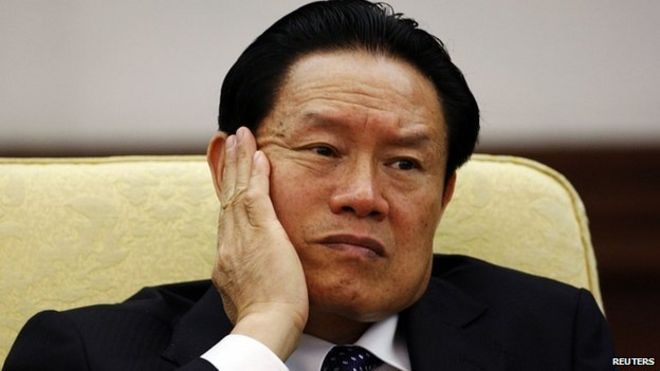While the focus of premier Li Keqiang’s speech at the annual Chinese parliamentary meeting was the “new normal” and the new target growth rate of 7%, Mr. Keqiang also addressed an anti-corruption campaign that he (along with president Xi Jinping) hopes to implement going forward. It seems that he has been following through on this promise, as former security chief Zhou Yongkang, “has been charged with bribery, abuse of power and the intentional disclosure of state secrets.” Formerly one of China’s most powerful men, Mr. Yongkang was put under investigation once president Jinping came into power in 2013.

China’s top prosecution body released a statement saying, “‘the defendant Zhou YongKang… took advantage of his posts to seek gains for others and illegally took huge property and assets from others, abused his power, causing huge losses to public property and the interests of the state and the people.'”
While ostensibly this indictment may indicate a true corruption crackdown consistent with the words coming from China’s political leadership, it may be nothing more than a calculated political maneuver. As John Sudworth puts it: “He will eventually be found guilty, of course. But we should hesitate before swallowing too readily the claim by the Chinese authorities that the downfall of so senior a figure proves the effectiveness of the anti-corruption campaign.” Ultimately, the question as to why Mr. Yongkang was indicted (when so many other senior Chinese officials abused their power for personal gain have not) remains unanswered, leading Mr. Sudworth to conclude that, “there is no good reason, other than a political one.”
According to analysts, this move may be nothing more than president Jinping consolidating his power base in order to remove people opposed to his reforms and repair a fractured image of the communist party.
Source: http://www.bbc.com/news/world-asia-china-32172600
Corruption is also very linked to the controversial household registration system in China (the hukou). According to my research, local government officials abuse their power and demand exorbitant sums of money to migrant workers who wish to change their hukou status.
Moreover, officials have used the system to illegally expropriate land from migrant peasants who wished to change their hukou status. Another example supposes the illegal charge of extra fees to migrant workers who wish to enroll their kids in public schools.
Indeed, unlawful practices are abundant and easy to find in modern China.
The anti-corruption campaign has targeted a wide spectrum of behavior by Chinese government officials. In a drive to cut down on excessive government spending, China has implemented measures preventing senior officials from using personal chauffeurs. As a result, many higher-ups in the Chinese government are being forced to take driving lessons. Although seemingly trivial, perhaps these measures will help boost the nation’s auto industry.
Link: http://articles.economictimes.indiatimes.com/2015-03-31/news/60682142_1_officials-cars-central-government-instructors